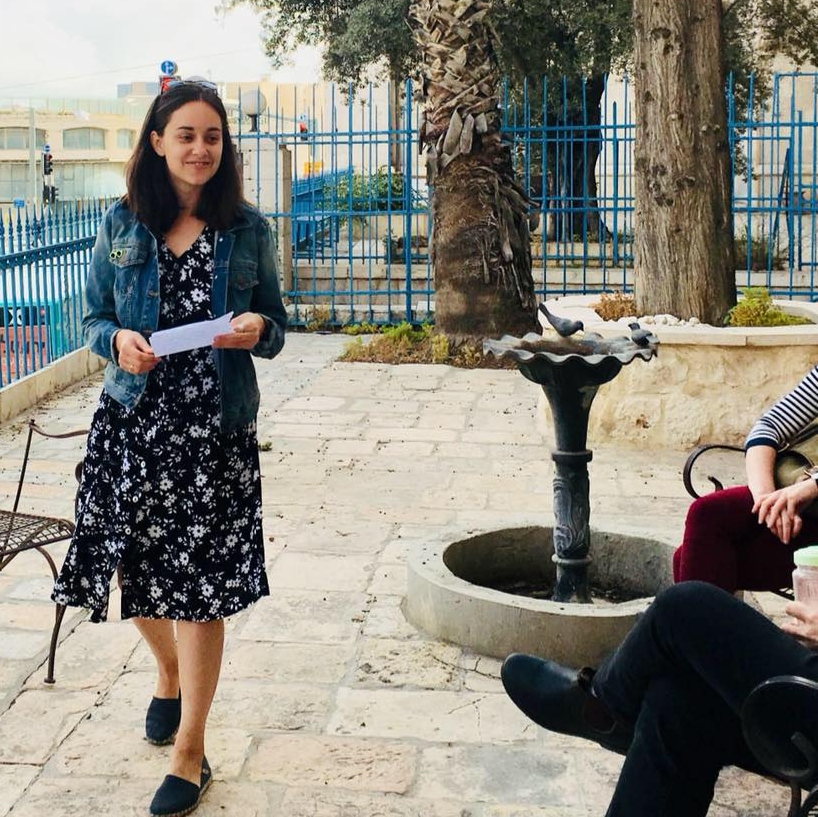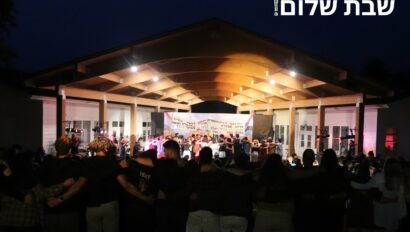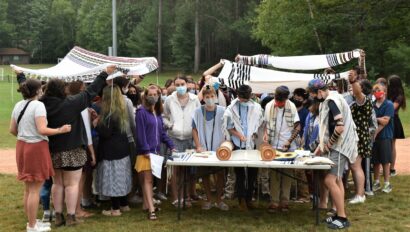Please enjoy a d’var Torah this week by Shani Abramowitz. Shani is in her third year of Rabbinical school at the Jewish Theological Seminary, where she is also working toward her Masters in Bible. Originally from Evanston, Shani has taught Yahadut at camps for two summers, and hopes to return for Kayitz 2019!
Lech Lecha: Be Brave, Be Great!
by Shani Abramowitz
In this week’s parashah, Lech Lecha, we read one of the foundational stories of the Jewish people. In the opening line, Abraham is instructed to leave his home and set off toward an unknown destination in service of the ultimate creation and development of the Jewish people and our history. The parashah begins with God’s command and gives us some helpful context for understanding the immensely difficult test that Abraham was expected to pass.
וַיֹּאמֶר יְהוָה אֶל־אַבְרָם לֶךְ־לְךָ מֵאַרְצְךָ וּמִמּוֹלַדְתְּךָ וּמִבֵּית אָבִיךָ אֶל־הָאָרֶץ אֲשֶׁר אַרְאֶךָּ׃
Vayomer adonai el avram: lech l’cha mei’artzcha umimoladt’cha umibeit avicha, el ha’aretz asher eireka.
And God said to Abraham, “go out from your land, from your birthplace, and from the house of your father, to the land that I will show you (Genesis 12:1).
An initial reading of this opening verse may suggest a sort of clarity that Abraham must leave behind everything he has ever known in order to embark on this new journey toward peoplehood; that a clean slate is required before Abraham can really get to work. And yet, the commentaries readily disagree about how we should understand the command of לֶךְ־לְךָ, Lech Lecha. Rashi, an eleventh century French commentator, understands this instruction to mean “go for thyself.” Meaning, go out for your own benefit, so you may merit the blessings and benefits of creating a nation. In his understanding of this phrase, Rashi is also making a comment on the significant personal benefits of this move. With this step Abraham can more authentically develop into the person he is supposed to be. Umberto Cassuto, an Italian commentator from the early 20th century, understands לֶךְ־לְךָ to mean that Abraham was commanded to either travel alone or only with those who expressly supported his mission.
Whether it’s Rashi’s or Cassuto’s understanding that resonates with you, it is clear that both commentators understand and underscore the bravery and radical curiosity that is required of Abraham in this moment. Here, Abraham is being asked to upend, to disrupt, and to explore. He is being asked to take a leap, and one that will have rippling consequences for generations to come.
Both Rashi and Cassuto understand this לֶךְ־לְךָ moment as the seminal moment in Jewish history. Abraham in this moment sets the tone for us and generations of our ancestors, making a move towards authenticity, challenging himself so that he can grow into the person he is meant to become and thus inspiring us as individuals and as a people to do the same. With bravery, curiosity, guidance, and growth, we can change the world, and we can create something from nothing.
This past summer, I read Torah for the first time in front of a minyan. After many years and many more false-starts, I arrived at camp for kayitz (summer) 2018 ready. I knew that the moment had come. With the support and guidance of my teachers, friends, and students, I finally took my place at the bimah (stage), and read the third weekday aliyah (section) of parashat Eikev. I stood there, early on that Monday morning, reading Torah for the Bogrim (9th grade) minyan. I was prepared, yet nervous. Excited, yet scared. Before I read my aliyah, I looked out across the room, and found the exact courage and support I needed in that moment. I saw the faces of many of my students and knew that I had made the right choice. And it became clear to me that what had motivated me the most was watching each of my students encounter their own לֶךְ־לְךָ moments over the course of the summer, seeing the way their curiosity worked and the many ways in which they pushed themselves to grow.
Camp is a place where לֶךְ־לְךָ moments are possible every day. Many of us arrive at camp with a clear vision for what we want to accomplish and the person we’d like to grow into over the course of the summer. And some of us come to camp with less clarity but exceedingly open to whatever is waiting for us. Whether it’s taking the swim test for the first time, or performing a solo song in your aidah’s machazemer (musical), we are all asked to be brave many times over at camp.
In this parashah, Abraham lets us know that if we are willing to give ourselves the permission to try, we can become great.
Shabbat Shalom!






